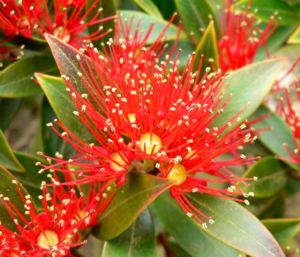
Rata (Maori mythology)
Encyclopedia

Maori mythology
Māori mythology and Māori traditions are the two major categories into which the legends of the Māori of New Zealand may usefully be divided...
, accounts vary somewhat as to the ancestry of Rātā. Usually he is a grandson of Tāwhaki
Tāwhaki
In Māori mythology, Tāwhaki is a semi-supernatural being associated with lightning and thunder.-Genealogy:The genealogy of Tāwhaki varies somewhat in different accounts. In general, Tāwhaki is a grandson of Whaitiri, a cannibalistic goddess who marries the mortal Kaitangata , thinking that he...
and son of Wahieroa
Wahieroa
In Māori mythology, Wahieroa is a son of Tāwhaki, and father of Rātā.Tāwhaki was attacked and left for dead by two of his brothers-in-law, jealous that their wives preferred the handsome Tāwhaki to them. He was nursed back to health by his wife Hinepiripiri. She helped him back to their house, and...
. Wahieroa is treacherously killed by Matuku-tangotango
Matuku-tangotango
In Māori mythology, Matuku-tangotango is an ogre who kills Wahieroa the son of Tāwhaki. In some versions, Matuku lives in a cave called Putawarenuku. Rātā, the son of Wahieroa, sets off to avenge his murdered father, and arrives at last at Matuku's village. He hears from Matuku's servant that at...
, an ogre. Rātā sets out to avenge the murder, travelling to the home of Matuku, where a servant of the ogre tells him that Matuku comes out to devour people each new moon, and that he can be killed at the pool where he washes his face and hair. Rātā waits till the ogre comes out and is leaning over with his head in the pool. He grabs him by the hair and kills him. Matuku's bones are used to make spears for hunting birds.
Rātā searches for his father's bones so that he can afford them the proper respect. He learns that the Ponaturi
Ponaturi
In Māori mythology, the Ponaturi are a group of hostile creatures who live in a land beneath the sea by day, returning to shore each evening to sleep. They dread daylight, which is fatal to them. They appear in a number of stories, including:...
have the bones in their village. He must build a canoe to get there. He goes into the forest, and fells a tree, and cuts off the top. His day's work over, he goes home, and returns the next morning. To his surprise he finds the tree standing upright and whole. Once again he cuts it down, but when he returns he finds the tree standing again. He hides in the forest, and hears the voices of the multitude of the hākuturi
Hakuturi
In Māori mythology, the hākuturi are guardians of the forest. They are responsible for guarding the forest, and to avenge any desecration of its sacredness. When Rātā cut down a tree without first making the proper incantations and rituals, the hākuturi rebuked him by re-erecting the tree...
(forest spirits, called rorotini in one account), who set to work to re-erect the tree, putting each chip into its proper place. He runs out and catches some of the hakuturi, who tell him they re-erected the tree because he insulted Tāne
Tane
In Māori mythology, Tāne is the god of forests and of birds, and the son of Ranginui and Papatuanuku, the sky father and the earth mother, who lie in a tight embrace...
, the god of the forest, by not performing the correct rituals before felling the tree. Rātā is ashamed, and expresses regret. Then the hākuturi make him a canoe, naming it Niwaru (alias Niwareka, Āniwaniwa, etc.)(Biggs 1966:450).
Rātā and his people launch the canoe and paddle off to find the Ponaturi. Arriving, Rātā cleverly surrounds them, kills their priests, and rescues his father's bones. The Ponaturi regroup and give chase. The battle goes badly until Rātā recites an incantation called Titikura that he overheard their priests recite while they were tapping together the bones of Wahieroa. In a flash all Rātā's dead warriors return to life and attack and slaughter all of the Ponaturi. Rātā is the father of Tūwhakararo
Tuwhakararo
In Māori mythology, Tūwhakararo is a chief in Hawaiki. Tūwhakararo went on a visit to the Āti Hāpai people, whose chief, Poporokewa, had married Tūwhakararo's sister Mairatea. In a wrestling match he was treated unfairly, and was killed in a treacherous manner...
, who is the father of Whakatau
Whakatau
In Māori mythology, Whakatau is a son of Tūwhakararo and Apakura. One day Apakura throws her apron into the sea, and a sea deity named Rongotakawhiu takes it and works it into human form, and Whakatau is born. The sea deity teaches him the arts of enchantment. As the child grows older, people see...
.
See also
- Rata (Tuamotu mythology)Rata (Tuamotu mythology)In the Tuamotu islands, the telling of the full cycle of the legend of Rata takes several evenings to tell. The legend of begins with his grandfather Kui, a demigod who marries Puehuehu. Their son Vahi-vero was stolen by two wild ducks that carry him to a distant island where two witches Nua and...
- Rata (Tahitian mythology)Rata (Tahitian mythology)Rata, in Tahitian mythology, is said to have become king of Tahiti when his uncle, king Tumu-nui, and his father Vahieroa are swallowed by a great clam while they are on their way to Pitcairn. When he reaches adulthood, Rata plans to avenge his father. As in the Tuamotuan version, Rata...
- LakaLakaIn Hawaiian mythology, Laka is the name of a popular hero from Polynesian mythology....
(Hawaiian and other Polynesian mythology)

